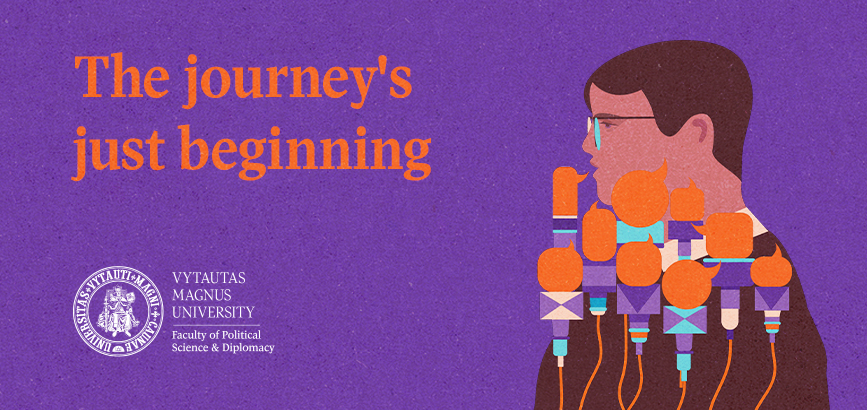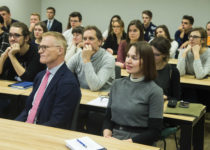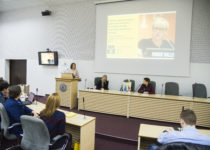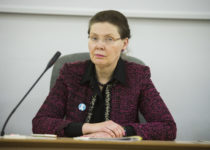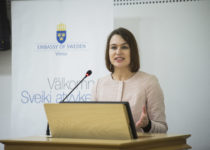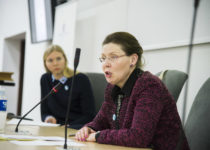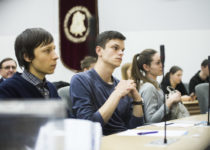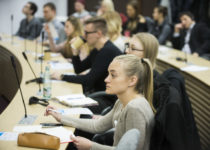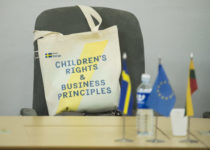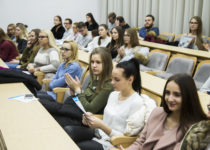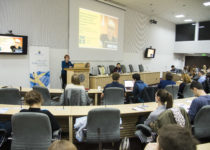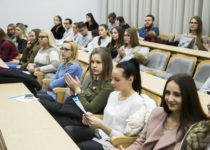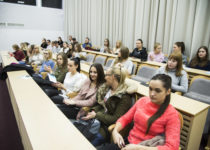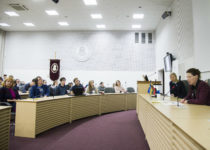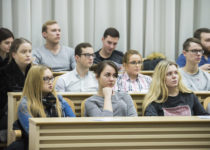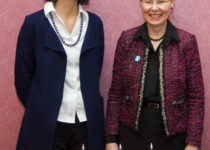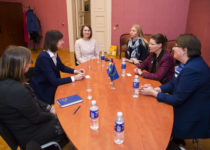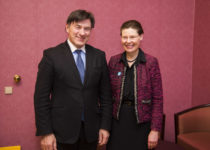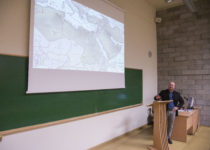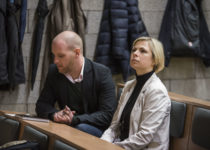Public Lectures by prof. Alpo Rusi
VMU visiting professor Alpo Rusi, who previously served as Finnish Ambassador and political adviser to Finnish President M.Ahtisaari, will give public lectures at the Faculty of Political Science and Diplomacy:
February 21, 13.15 , Gediminas street 44, auditorium 303. Lecture : ”Finlandisation- a threat or a salvation during the Cold War and After”
February 22, 11.00, Gediminas street 44, auditorium 203. Lecture: United Nations’ General Assembly: decision making and diplomacy from personal experience ”

Ministry for Foreign Affairs of Finland has granted a one-off fund of 20 000 euros for the Rudolf Holsti named Professorship at Vytautas Magnus University in Kaunas, Lithuania, in the Faculty of Political Sciences and Diplomacy.
Vytautas Magnus University has appointed Dr. Alpo Rusi, Ambassador emeritus, Adjunct Professor at Helsinki University, to this named Professorship. Dr. Rusi has been a visiting professor at Vytautas Magnus university since March 2016.
As countries in the Baltic Sea region Finland and Lithuania have common interests both in security policy as well as in the European union. The named professorship will promote the common knowledge about issues related to the Baltic Sea co-operation in particular for the future challenges. It also will facilitate the deepening of co-operation between the universities of our two countries.
“Ambassador Alpo Rusi has a long and meritorious career in the Finnish foreign service as well as in the international assignments benefitting Finland. His appointment to the Rudolf Holsti named professorship to Kaunas is a valuable step for Finland and Lithuania”, Foreign Minister Timo Soini has stated.
The launching of the professorship will promote the knowledge concerning Rudolf Holsti (1881-1945) and his lifetime achievements as foreign minister of Finland during the early years of Finland’s independence 1919-22 and during the difficult times in the years 1936-38. He also served his country as a Special Envoy to Riga, Tallinn, Bern and the League of Nations between 1919 and 1940.
VMU Opened Research Centre Named After A. Sakharov
On 18 December, Vytautas Magnus University (VMU) hosted the grand opening of its new subdivision, Andrei Sakharov Research Centre for Democratic Development. Focusing on issues of human and civil rights, the centre will conduct research into the politics in Central and Eastern European countries analyzing whether they fulfill their international commitments to protect human and civil rights.
Andrei Sakharov was one of the bravest critics of the Soviet regime who eventually became the symbol of the struggle for fundamental human rights. After gaining prominence as the inventor of the Soviet hydrogen bomb, the scientist became concerned about the consequences his invention would have on the humanity’s future and began raising awareness of the dangers of nuclear arms. In the USSR, Andrei Sakharov was seen as a dangerous dissident. His efforts contributed to the signing of the Partial Nuclear Test Ban Treaty in 1963 and the establishment of the Committee on Human Rights seven years later, which was the result of joint work by Sakharov and his peers. In recognition of his achievements, Sakharov was awarded the Nobel Peace Prize in 1975. Because of the activist’s consistent attempts to liberate other Soviet dissidents and criticism of the regime, Sakharov was exiled to the isolated city of Gorky (Nizhny Novgorod) in order to restrict his foreign connections. The European Parliament has established the Sakharov Prize for Freedom of Thought, which is awarded to individuals or organizations that fight for human rights and fundamental freedoms.
A discussion was held during the event by Sakharov’s daughter, researcher Tatiana Yankelevich from the Davis Center for Russian and Eurasian Studies at Harvard University (USA), political scientist and analyst Lilia Shevtsova from the Chatham House (UK), founders of the Moscow School of Civic Education Lena Nemirovskaya and Yury Senokosov (Russia), Co-Director of the Institute for Statecraft Chris Donnelly (UK), Senior Russia Analyst at Radio Free Europe Brian Whitmore (Czech Republic), Project Director of Freedom House Lithuania Vytis Jurkonis, Director of European Security Programme, Vilnius Institute for Policy Analysis Simas Čelutka, and VMU representatives.
PMDF absolventų susitikimas
2017 lapkričio 17d. Vytauto Didžiono universiteto (VDU) Politikos mokslų ir diplomatijos fakulteto (PMDF) absolventų susitikimas. Diskusija „Išsilavinimas 360 laipsnių kampu: asmenybės ir patirtys“. Diskusijoje dalyvauja PMDF absolventai: dvasininkas, diakonas Vincentas Lizdenis; restorano „Dine“ vadovas Arminas Darasevičius; dainininkė, portalo CatFly vadovė Živilė Povilaitytė; Lukas Jankauskas – „INTERMEDIX“ direktorius ir Dr. Ernesta Buckienė. Diskusiją moderuoja LRT žurnalistė ir laidų vedėja Agnė Kairiūnaitė. Video medžiaga: PMDF studentai Ričardas Mikavičius ir Rūta Beinoriūtė
Centenary of Independence of Finland: experts’ discussion
On the 18th of December experts’ discussion devoted to reminiscing and analyze the centenary of the independence of Finland took place at the Faculty of political science and diplomacy of Vytautas Magnus University in Kaunas.
His Excellency Mr. Christer Michelsson, Finnish Ambassador to Lithuania, Mr. Henrik Meinander, professor of Helsinki University, also researchers of Vytautas Magnus university- dr. Linas Venclauskas, dr. Giedrius Janauskas, dr. Sima Rakutienė, dr. Tomasz Blaszcak and others – discussed Finnish role in the region, historical and political relations with Sweden and Russia, socio-political transformations of Finnish society.
Professor Henrik Meinander presented his book „A History of Finland: directions, structures, turning points“. The book highlights how Finland “gradually transformed and maturing into a conscious nation, independent state and skillful adapter of modern technology“.
Finnish Parliament declared the independence of the country on the 6th of December in 1917.
The event took place in V.Putvinskis st. 23 – 312, at 14.00.
More information: Vice- dean dr. Sima Rakutienė ( sima.rakutiene@vdu.lt )
Swedish Ambassador M.C.Lundqvist gave public lecture
On Thursday, the 30th of November at 13.30, Swedish Ambassador Maria Christina Lundqvist gave public lecture “More women- more peace. Swedish feminist foreign policy”. It took place in VMU Small Hall ( S.Daukantas st. 28 – 205). Her Excellency Maria Christina Lundqvist raised the issue of women role in national, regional and world politics.
After the event Swedish ambassador met faculty and university members in Rector’s office to discuss the future plans and projects.
For more information, please contact dr. Sima Rakutiene, vice-dean at the Faculty of Political science and Diplomacy ( sima.rakutiene@vdu.lt )
Visit of Israeli journalists-analysts
Religion and Power
Discussion between Prof. Milda Ališauskienė from Dept. of Sociology and Dep. of Political science at Vytautas Magnus University (Lithuania), Prof. Kathleen M. Moore from Dept. of Religious Studies at UC Santa Barbara (USA), and Assistant Professor Katarzyna Zielińska from the Institute of Sociology at Jagiellonian University (Poland). The participants discussed the subject of recent international conference in Lithuania, Religion(s) and Power(s), where Prof. Kathleen M. Moore and Ass. Prof. Katarzyna Zielińska were keynote speakers.
The head of „United Kaunas“ talks about political science
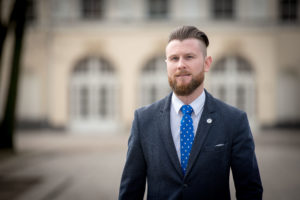
The bachelor‘s program of Political Science in Vytautas Magnus University is one of the most popular programs, and the employment opportunities for graduates are one of the best ones. The head of the community organization „United Kaunas“ and member of the Kaunas city municipality City Council, Andrius Palionis, agreed to share his thoughts about career and studies of Political Science.
In your opinion, what are the main advantages of the VMU Political Science study program that make it different among other similar programs in other universities?
Personally it is difficult to compare it with other programs of Political Science, because I studied political science only in VMU. However, I can highlight what I liked and why I recommend VMU to young people who are interested in this field. First of all, the philosophy of the university and the attitude towards the student. Here the student and the professor are colleagues that respect each other. I improved and learned specifically during discussion. Of course, I was deeply impressed by the professionalism of most of my lecturers. Another important aspect – the opportunity to realize your potential in the environment of the University. If I would have an idea of what I can do in the University or in the Faculty, I would receive only help and positivity.
You finished the bachelor‘s of Political Science in VMU. Did you already envision your career when you chose your bachelor‘s studies?
I had at that time. I wanted to study political science specifically, and later to become a diplomat or politician. My life is currently going in a very similar direction.
How, in your opinion, the profession of a political scientist different?
To me this profession is different, because it teaches you to look at life from a wider point of view, than people are typically used to do. It also helps you understand that in life there usually isn‘t just one truth or one right decision. And that is very important when you make decisions both in your personal and your professional life. I often use this comparison: someone from a different profession is ready to only be an expert in one area (like an engineer, architect or medic), but when you study political science you have a chance to study many subjects, but not as deeply as an expert would know their area. Which is why when you get a broad education you can later decide during your career if you need to gain more knowledge, or if what you have learned is enough.
In your opinion, what are the main current challenges in the world today, and how could political scientists help solve those processes?
The modern world is incredibly fast, dynamic and diverse. Which is why there are many various challenges (refugee crises, rising nationalism in states, rearmament and redistribution of powers, redistribution of economic centers, etc.). I see, that political scientists, who continue their careers in the academic field and who make up the minority of graduates, can contribute by discussing about different issues not just in small academic circles, but also by educating the society, sharing their insights, shaping the public opinion. Most of the graduates, in my opinion, contribute every day to solving different issues through their abilities to look at the bigger picture, analyze and think critically.
A. Venckus: I am thankful to FPSD for who I have become
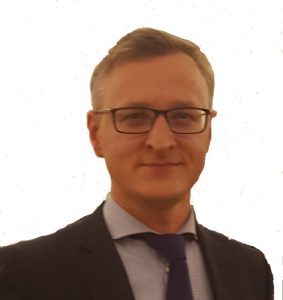
Second secretary of the Lithuanian Embassy in Germany, dr. Antanas Venckus, shares his thoughts about the bachelor’s program of Political Science, the master’s program of Diplomacy and International Relations and his career.
What motivated you to choose the bachelor’s of Political Science, and later the master’s of Diplomacy and International Relations? Why, out of the vast amount of programmes in various universities, you chose Vytautas Magnus University specifically? Was it a coincidence or a long-term goal?
In fact, it was a coincidence, I cannot say otherwise when I think about it in perspective. I wanted to study Economics in VMU, but my grades were not high enough, so my second option was Political Science. I wanted to study in VMU very much, so I was extremely happy I got into a great university that I had already heard a lot of good things about. To be honest, I didn’t even think about studying somewhere else.
What did the VMU Diplomacy and International Relations degree give you?
Studying in the VMU Faculty of Political Science and Diplomacy didn’t only shape my personality, but also gave me the foundation for my further career, by giving me the most important knowledge, strengthening the competences needed for my professional development. Without the foundation that I got during the first 6 years studying in the Faculty, I definitely wouldn’t have the job I have now, and probably could not even dream about it.
What did you like most in VMU? What advantages could you name? Maybe something was missing?
Just like many others, I would like to underline that liberal mindset when it comes to your studies, an atmosphere of complete trust in the whole academic community. I do not think that there is a similar university in Lithuania, and that is exactly what gives the best foundation for such a good academic atmosphere. Western study methods, exclusive attention to foreign languages, lecturers that give all they have to their work and increasingly international environment – these are the significant features of VMU, that need to be nurtured, by protecting your identity among the large number of tertiary education institutions in Lithuania. This is how VMU will always be different.
What is your current occupation?
I was very lucky that after studying Diplomacy and International Relations I became a diplomat. I have been working in the Lithuanian Diplomatic Service for already 12 years, and – most importantly – I can work for Lithuania by using all my knowledge and all the abilities I have developed during my studies in the Faculty. I will always be thankful to my University and to my lecturers for that. As a sign of gratitude, I give back to the faculty: when I am in Lithuania I gladly give lectures to the master’s students of the Diplomacy and International Relations study program, I teach them the details of a diplomat’s life. Currently I am working in the Lithuanian embassy in Germany, I am responsible for the development of Lithuanian and German economic relations. However, I am waiting forward to the fall semester of 2017, when I will come back to the auditoriums of VMU to give further lectures to students.
Three main things, that a student should do, in order to achieve what you have achieved, or more…?
It is hard to measure your achievements, as you can always do more and better – it gives you motivation to improve and never stop. When I remember myself, just after graduating a simple high school in the Kaunas region, what helped me most was the inclusive academic environment: amazing teachers and wonderful students. It is very important for students to like their studies, and to give all that they have when they are studying. Studies in the Faculty gave quite a broad, but a high-quality education, which gave me a foundation for my further career in many fields. It is also important to learn foreign languages, and VMU is the best place for that – learning languages (not just English) opens many doors to further study and work in any corner of the world. And, lastly, it is important to take all that you can from the lecturers, who are very dedicated, and to always believe in yourself – because I really know, that VMU Faculty of Political Sciences and Diplomacy students graduate with more than good knowledge, which is why they are regarded as very promising, dedicated and responsible professionals. There are many examples of this, at least in the Lithuanian public governance. Which is why it is important to believe in yourself and reach for your goals, and your studies will give you a good foundation.
What are your proudest achievements?
I am always proud that I had a chance do my doctor’s degree in the Faculty of Political Sciences and Diplomacy and finish it successfully. Although I had to coordinate my studies with my work in the Ministry of Foreign Affairs and at the Permanent Representation of Lithuania to the EU in Brussels. It gave me the chance to start working in the academic field, where I have been working for more than 10 years. Regarding diplomacy, it is nice, that foreign diplomats in Berlin showed great trust and elected me as the President of the Economic Diplomats club residing in Germany. This position is a great responsibility, but also a significant evaluation of my career as a diplomat. All this helps me to always move forward and try to improve, so I could contribute more to the well-being of the country of Lithuania and its people. I feel a great responsibility and duty for that.
What would you like to wish to those that dream of studying, or are planning to study in the VMU Faculty of Political Science and Diplomacy?
First of all, I would wish to think if it is definitely their area of interest. Studying Political Science gives you great chances for future employment, but it is important to enjoy it. If you are sure about your choice, then I wish you to take all you can get, because the environment and staff of the Faculty will definitely provide you with the best possible conditions to improve and grow, not just as personalities, but also true professionals in political science. I can really attest to that, because I myself am very happy to have had this opportunity to study Political Science and later deepen my knowledge in the master’s of Diplomacy and International Relations.
When did you start and finish your studies? Which programme?
I studied in VMU from 1999, when I was accepted to the Political Science bachelor’s program. In 2003 I continued to study Diplomacy and International Relations in the same faculty, and in 2005 I was accepted to the doctorate program, which I finished in 2010, when I received my doctor’s degree in Political Science.
O. Vaitkevičienė: in VMU you can feel like a colleague

A graduate of the Political Science bachelor‘s programme and the Integrated Communication master‘s programme, Odeta Vaitkevičienė, talks about her studies in the Faculty of Political Sciences and Diplomacy.
What motivated you to choose these particular programmes (political science/integrated communication) and why, out of so many programmes offered by various universities, you chose Vytautas Magnus University? Was it a lucky coincidence or a long-term goal?
From my teenage years I had the desire to be a journalist, I went to journalism school, where talented and competent lecturers talked about how to be a professional journalist. Lecturers would often suggest in indirect ways, that it is better to have a bachelor‘s degree in the field which you want to write about, and then complete a master‘s degree in journalism. I thought, that I would find it most interesting to write about politics, so political science caught my eye. Why integrated communication? I thought that it is a field, which is very close to my bachelor‘s degree, because I had also completed a minor in public communication. This continuity occurred naturally. While I was studying, I liked everything, everything felt right. I liked what I did, what I heard, the lecturers, the team and the whole package. Even now I tell many people, that I miss the University and the spaces. Even today, while I was going to the interview, I was thinking that even though so many years seem to have passed since I finished my studies, everything seems so familiar and attractive when I come back.
My studies in VMU were a complete coincidence, because throughout my whole life I always thought I will only study in Vilnius, nowhere else. Probably because I myself am not from Kaunas, I, like many others, had my eyes set on Vilnius. Why Vilnius? I don‘t know why, I cannot explain. Maybe because it is the capital. I remember like it was today, when it was the last evening when you can edit your priorities in your online application, and at five minutes to midnight I completely turned that list upside down. I don‘t know why, but I put the VMU Political Science study programme at the top. There is no explanation why. Nobody could understand me – not my parents, nor my friends, but when I got a chance to study for free I didn‘t think twice about studying somewhere else, because I was happy at that moment. That‘s why I said, that it was a complete coincidence, there were no plans. It was probably fate. Just like fate put many things in place after I finished school.
What did the VMU Political Science and Integrated Communication programmes give you?
Maybe it is better to say what they didn‘t give me? Because I can name many things – a wide point of view, knowledge, communication, great people that I have met – and I am not even talking about my fellow students and lecturers, that I still talk to when I meet them. Experience, internships, because if we are talking about internship opportunities, I think I took all the available opportunities. One of my internships was in the Parliament of the Republic of Lithuania, another one – in the consulate of Spain, and I also went to an Erasmus exchange. Which is why I would like to say – it is better to ask what the university didn‘t give me, and what it could give in the future. VMU fulfilled my expectations completely, because before studying there, I didn‘t even imagine what it could be like to study there. Overall, when you are accepted to university, it is a completely new step.
What did you like most in VMU? What advantages could you name? Maybe something was missing?
It is a difficult question, especially about what was missing. For me personally, the biggest advantage, and the main thing that I always tell everyone outside of VMU, is that you feel like you belong. Not just between your fellow students, but also between lecturers. To me, for example, it was important that I was never afraid to ask questions, I was never afraid to stop a lecturer before or after a lecture or, if I need to, just write them if I have a question. That sense of belonging and trust I could only call being a colleague. In the University you can really feel like you are a colleague. It was extremely important, at least for me. I am happy, that I didn‘t have to sit somewhere in the corner, too afraid to ask a question or come to the lecture at all. Overall, I would be happy to go to lectures. I could really say, that I was that strange girl, because often others would think how to skip lectures, while I would feel bad if I missed a lecture. When you come to a lecture you can learn so many things, because the atmosphere is different.
What is your current occupation?
Currently I am the head of the Kaunas district police department communications branch.
Three main things, that a student should do to achieve what you have achieved, or more…?
It‘s different for everyone. I cannot name three things, because there are no three special steps, goals or recipes that would work for everyone. What I could suggest is to enjoy everything that VMU and all the people in the University have to give. To enjoy, and take as much as you can when it comes to knowledge, experience and internship opportunities. That is very important for you as a personality that is still discovering itself, for a future professional. Only theoretical knowledge is not enough for you, so you need to be curious, active and open to new things and new information. And, of course, you have to reach for your dreams, even though I couldn‘t say that all the things I did after university were related to my goals, because, as I have already said, many things in my life happened purely because of fate. It is also very important to improve yourself, widen your point of view, communicate. It is important to expect a lot from yourself. You don‘t need to have big career goals, but you have to really want what you are doing.
What are your proudest achievements?
To be honest, I could not say that I have achieved so much, even though when I think about the time that passed since I have finished my studies, it seems like there really is something to be proud of. I am quite critical and I do not think, that where I am right now is my final stop. Maybe someday I will go back to university, and then I will be able to say that I got everything that the University has to give. Now I think I am still in the process of achieving my goals, and in 5 or 10 years, maybe, I will be able to talk about my achievements.
Did your studies in VMU Faculty of Political Science and Diplomacy contribute to where you are now? If yes, how?
In my opinion it definitely did contribute, because I became the person I am now mostly because of the University. Of course many things come from your family, childhood and teenage years, but in one‘s career path the university is a very important stop. Just after finishing my bachelor‘s I immediately got a job in Vilnius during Lithuania‘s presidency in the European Union. It just so happened that my job was directly related to my field of study. While I was finishing that job I applied for a master‘s degree, where I deepened my knowledge of public communication and public relations. After finishing my master‘s degree I got my current job. Everything was somehow closely related. I tend to think that what the University gave me while I was studying Political Science gave me a lot of things that helped me in my previous job. It was completely related to politics and international relations. In the end, my language skills helped as well, since I did most of my work in English. After I became more confident in a different field, I can now feel good in my current job. Both study programmes, which are, in my opinion, closely related (even though the titles are different), gave a lot when it comes to my professional achievements.
What would you like to wish to those that dream of studying, or are planning to study in the VMU Faculty of Political Science and Diplomacy
Lots of curiosity and lots of courage. Courage to take everything, that VMU has to give. It would probably be the main wish, because the prospective student has to be truly curious and brave. Brave to ask, learn, go to lectures and listen – because you can read at home, but lecturers, who share their experience, will give you a different picture.
When did you start and finish your studies? Which programme?
2009-2013 – bachelor‘s in Political Science
2010-2013 – minor in Public Communication
2013-2015 – master‘s in Integrated Communication




